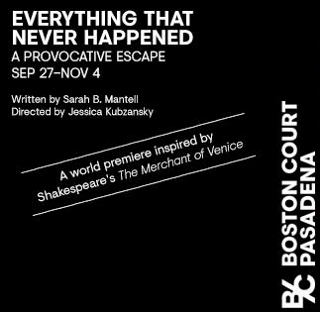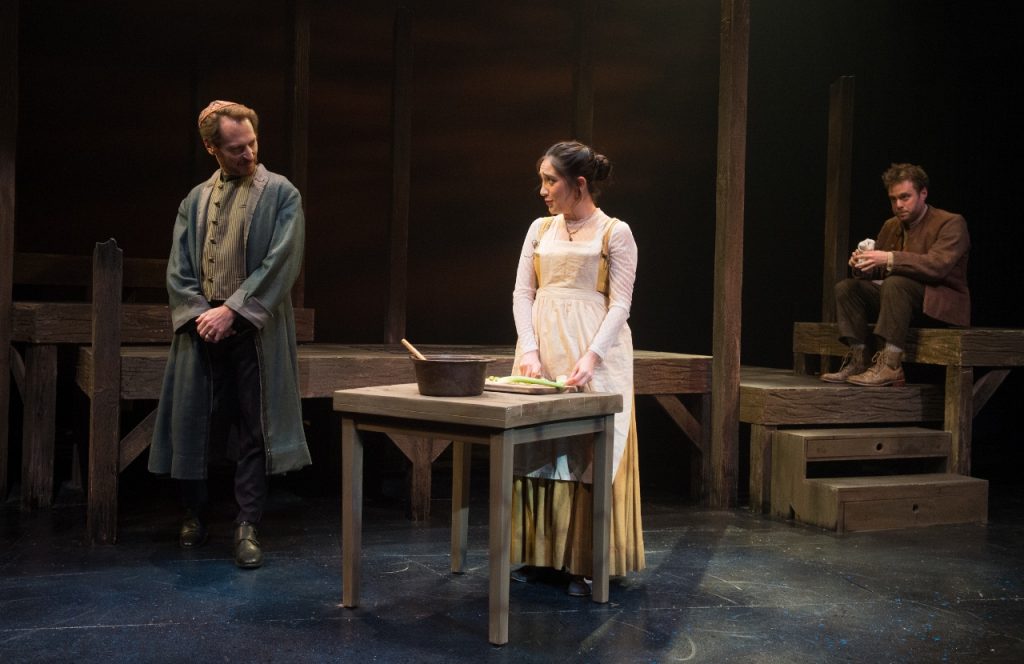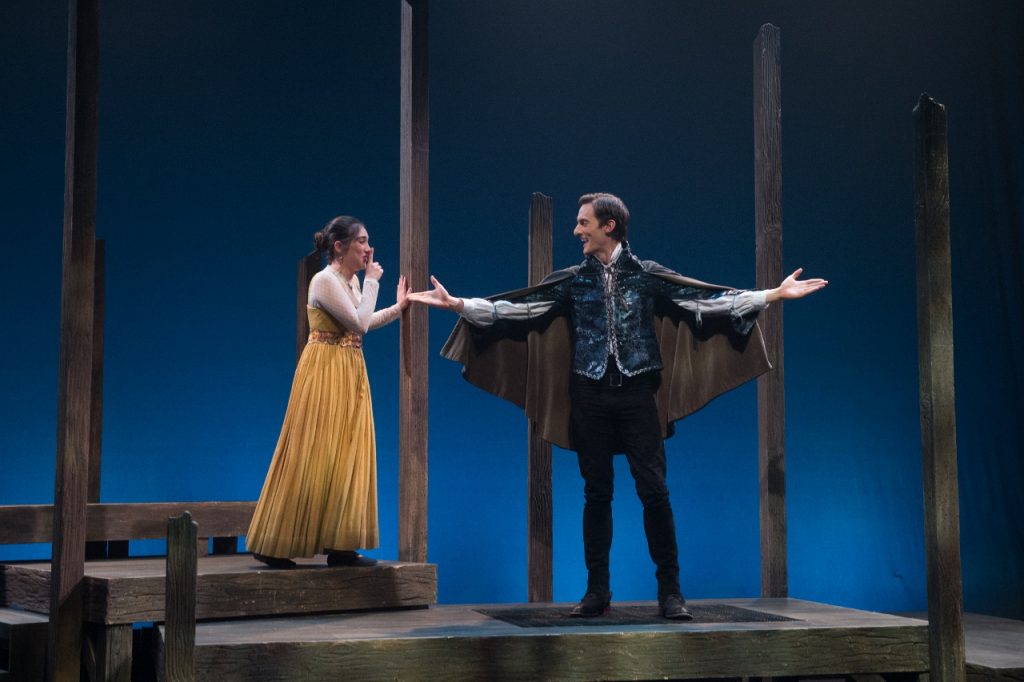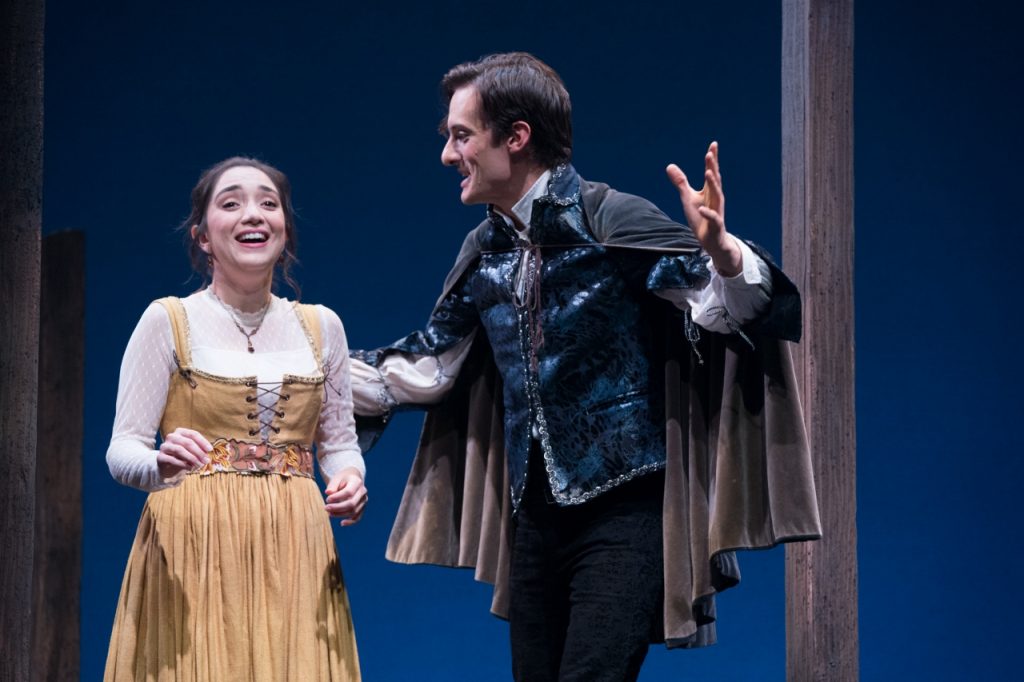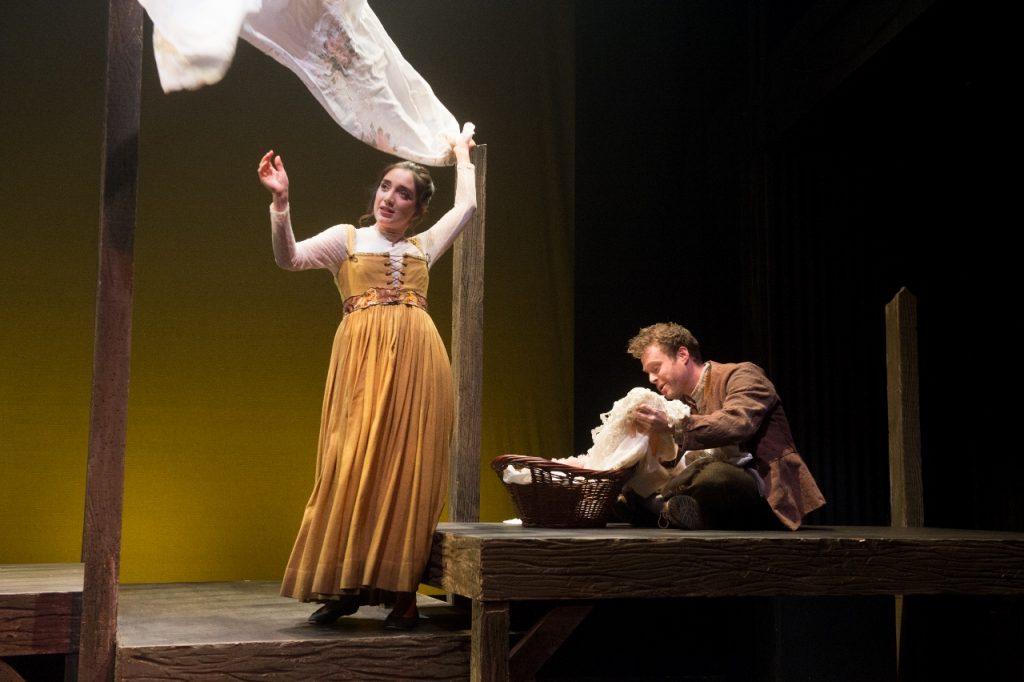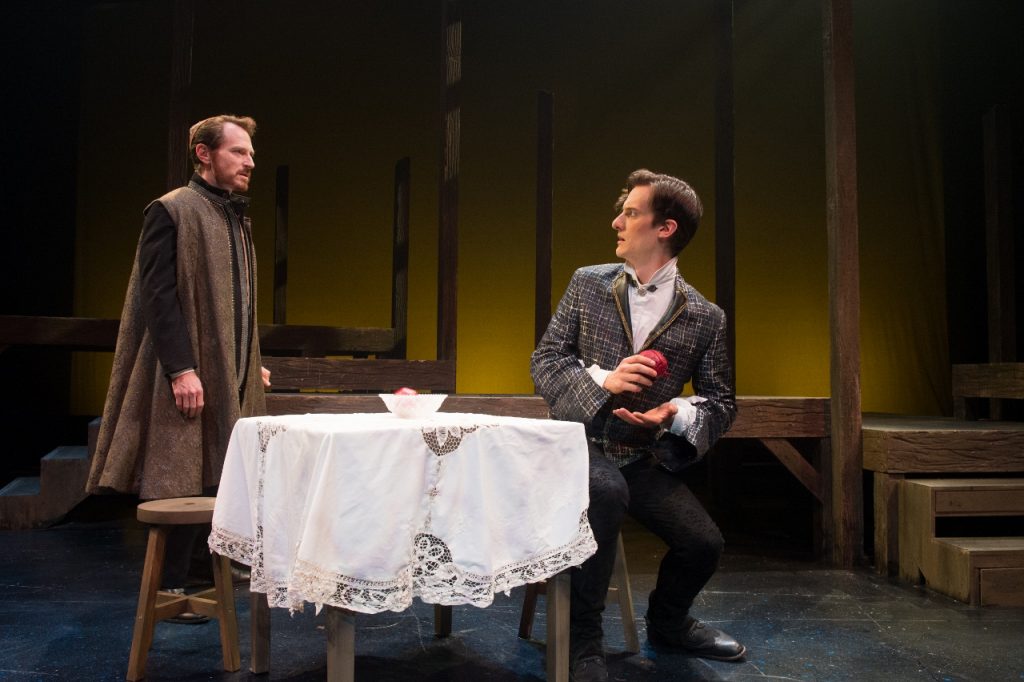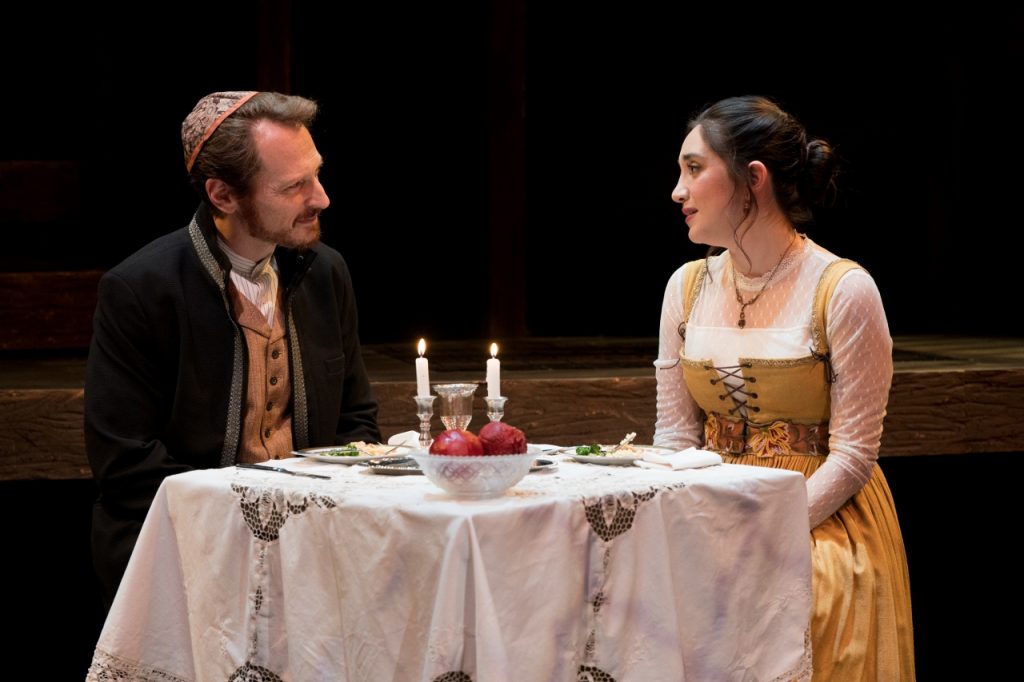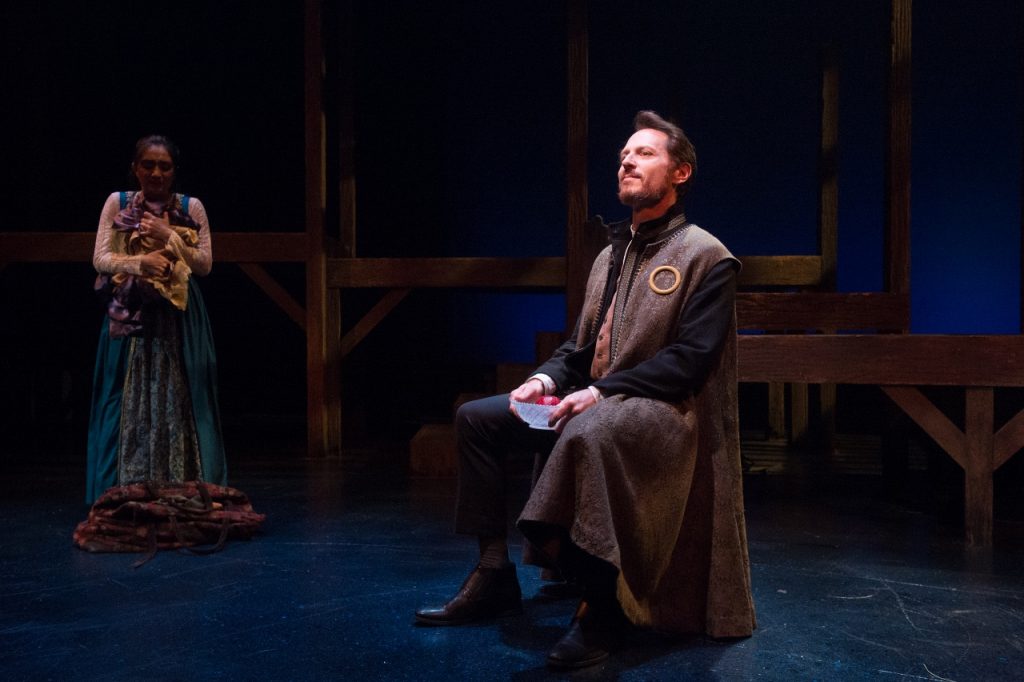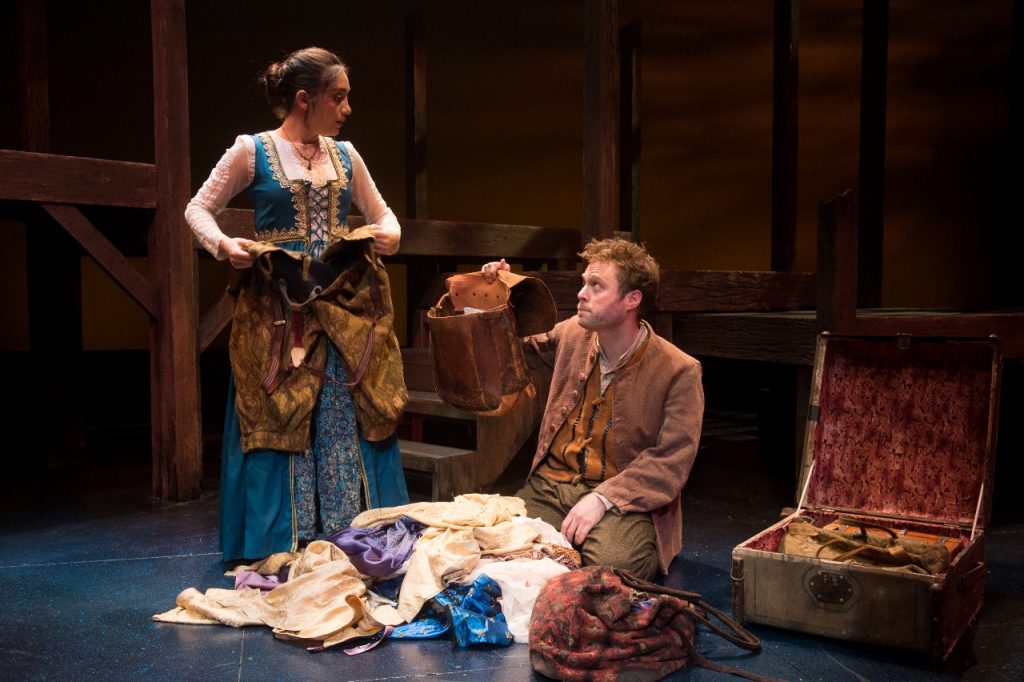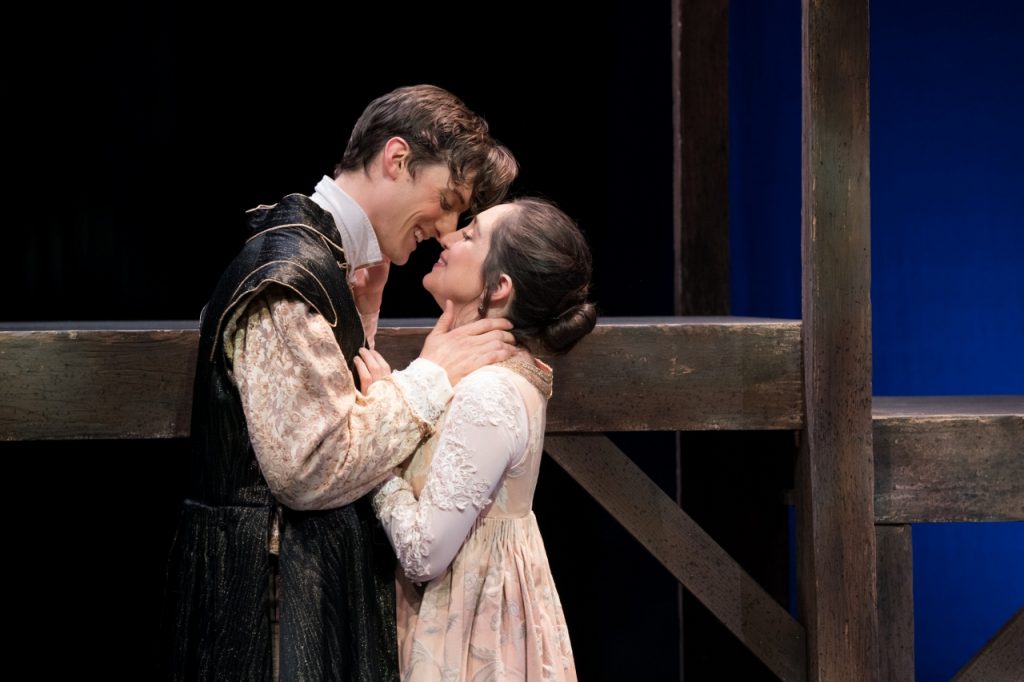ANCIENT LIES AND MODERN QUESTIONS
Theatrical magic happens when all the elements of a production come together to form a seamless whole; when the text, direction, acting, and technical contributions feel so organically intertwined that it is hard to tell where one person’s work ends, and another’s begins. Everything That Never Happened at the Boston Court is intelligent, funny, and quite beautiful. It is also magic — a complete universe unto itself. Playwright Sarah B. Mantell, director Jessica Kubzansky, a gifted team of designers and technical staff, and a marvelous cast take you into an entirely reimagined world, influenced, but not defined by, The Merchant of Venice.
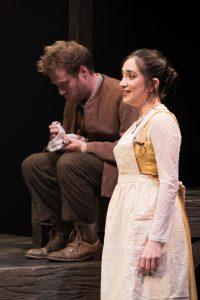 Ms. Mantell is not interested in paraphrasing Shakespeare, nor does she place the action in a linear timeline. We are in Venice and mostly it is 1596, but the lie of Blood Libel flourishes in many years, past, present, and future. Jessica, Shylock’s daughter, is aware of events from as far back as the 12th Century and as far forward as the 21st and beyond. She internalizes all those centuries of hatred, and they are always near at hand for her.
Ms. Mantell is not interested in paraphrasing Shakespeare, nor does she place the action in a linear timeline. We are in Venice and mostly it is 1596, but the lie of Blood Libel flourishes in many years, past, present, and future. Jessica, Shylock’s daughter, is aware of events from as far back as the 12th Century and as far forward as the 21st and beyond. She internalizes all those centuries of hatred, and they are always near at hand for her.
Blood Libel is the belief that Jews murder Christians to use their blood for ritual purposes, particularly in the baking of matzoh for Passover. Shylock’s penalty for non-repayment of a loan, his “pound of flesh,” is horrifying and powerful beyond its obvious grotesquery because you can’t cut off flesh without spilling blood. Any public accusation of a Jew wanting Christian blood casts a shadow over his whole community, endangering all who are forced to live behind the ghetto gates.
The story is simple. Jessica meets and falls in love with Lorenzo. He ostensibly does not know she is a Jew, nor that her father is Shylock, rumored to be the cruelest and meanest of all the Jewish moneylenders. A large loan to a friend of Lorenzo’s is the mechanism that enables Jessica to run away with Lorenzo, aided by a secretly besotted family servant, Gobbo. She knows that leaving will break her father’s heart, but she is determined to convert to Christianity and marry Lorenzo. Shylock loves his daughter and certainly sees her as a cut above most if not all females. Jessica wants more.
But what is it to be a Jew? What is it to be The Other? If we throw away our cultural identities, do we find freedom? Is it worth it? Who will we be once we have assimilated? These are not easily answered questions. Ms. Mantell explores them by asking yet another question: What does it mean to be a woman in a world of men who believe you are not quite human? How is it possible to have given birth to the sons who grow up to be these men? This being a dilemma for a Jewess in 1596 is not surprising. That it is still a question for all women in 2018 is shameful. I saw the show the day Brett Kavanaugh was confirmed.
 Oddly, and surprisingly, it is the anguish of Jessica’s plight as a woman that ends up providing the true ray of hope. She is astonished upon recognizing that her inferior status stands, whether she is Jew or gentile, yet it is that self-knowledge that reconnects her to her father. She will take the freedom she finds, whatever it is, and hopes he can do the same. We have no idea what the future holds for either of them, but both now see the world and each other more clearly. There is devastation but also buoyancy.
Oddly, and surprisingly, it is the anguish of Jessica’s plight as a woman that ends up providing the true ray of hope. She is astonished upon recognizing that her inferior status stands, whether she is Jew or gentile, yet it is that self-knowledge that reconnects her to her father. She will take the freedom she finds, whatever it is, and hopes he can do the same. We have no idea what the future holds for either of them, but both now see the world and each other more clearly. There is devastation but also buoyancy.
Leo Marks is marvelous as Shylock, and he and Erika Soto as Jessica are intimate and endearing as father and daughter. You know she loves him. But you also know she loves Lorenzo. Ms. Soto and Paul Culos are sweet and happily childlike together. “Oh my God,” she says when he smiles, “Did you just fall in love with me?” Solo and Mr. Culos make us believe it, yet they also allow us to accept the emotional, spiritual, and financial complexities of the characters’ bargain. Dylan Saunders is terrific as Gobbo. You want him to get the girl, even though it is utterly impossible. But does it have to be?
Ms. Kubzansky is a marvel. Her directorial touch with the actors is glorious and expansive where needed, yet exquisitely contained, allowing us to see the characters as real people making decisions right before our eyes. Her staging is endlessly inventive, utilizing the brilliant teamwork of scenic designer François-Pierre Couture and props designer Courtney Lynn Dusenberry. (The movement of the gondola is worth the price of admission.) Costume designer Denitsa Bliznakova brings together anachronistic elements in effective and sometimes madcap ways. Sound designer John Nobori and lighting designer Jayme Lee Smith also do wonderful work.
Everything That Never Happened has stayed with me in the several days that have followed. I’m still turning it around in my mind. It is like a puzzle that once solved reveals even more engaging puzzles hidden within. Did I get what the playwright and director were trying to communicate? I don’t know. Maybe they are telling a different story to each of us. We connect in whatever ways that allow our own moments of delight and deliverance.
photos by Jenny Graham
Everything That Never Happened
Boston Court Performing Arts Center
70 N. Mentor Ave. in Pasadena
Thurs-Sat at 8; Sun at 2
ends on November 4, 2018
for tickets, call 626.683.6801 or visit Boston Court
